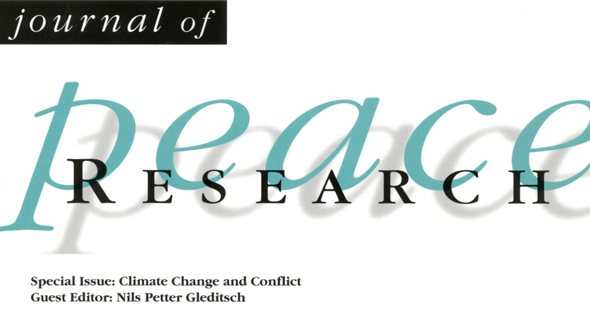-
Responses to JPR Climate and Conflict Special Issue: François Gemenne (Sciences Po)
April 2, 2012 By François Gemenne
If you want a government to address something, make it a defense issue. No need to hold a PhD in political science to know that governments tend to give the highest priority to issues that involve national security interests – one can complain and whine about it, but that’s the way it is.
Given the insufficient efforts to address climate change, and the need to do so urgently, making climate change a security issue could thus appear a tempting strategy. And in recent years, climate change has indeed been increasingly presented as a matter of international security: the IPCC and Al Gore were awarded the Nobel Prize for Peace, the issue was debated at the UN Security Council, and a significant number of reports and papers have made the case that climate change presents significant security threats (via migration, pressure on water and food resources, etc.).
All of this is certainly well intentioned, but the problem is, as they say, that the road to hell is paved with good intentions. And there are indeed two significant pitfalls: first, governments might react by beefing up their defense capacities and increasing their military budgets rather than by addressing the root cause of the problem – greenhouse gases. Second, the actual evidence that can be presented on the climate-security linkages is not always very convincing. Many of the studies on the subject are contained in reports from government agencies, defense think tanks, and other interest groups. That’s not to say that such reports are bad science – some are actually quite good – but they are policy-oriented and are there to promote an agenda.
Yet there’s a lot to say about the linkages between the effects of climate change and security – especially on human security. And governments could also be better prepared to address this issue, including their military. A recent parliamentary report highlighted the unpreparedness of the French army, for example.
But what we say about the relationship between climate and security needs to be based on actual empirical evidence, rather than shallow claims aimed at prompting action on the curbing of greenhouse gas emissions. Thus one can only salute the work conducted in the latest special issue of the Journal of Peace Research, where 17 peer-reviewed articles look at the linkages between climate change and conflicts. They provide a nuanced outlook of the risks of conflicts induced by global warming and much more robust evidence than what we have come to be accustomed to.
Yet the work is only beginning. As one of the first coordinated efforts to address the climate-security nexus in a peer-reviewed fashion, the special issue raises as many questions as it provides answers. Three of them seem particularly salient:
- First, the articles discuss only the relationships between climate change impacts and conflicts. Though conflicts are obviously an important dimension of human security, they cannot encompass the whole spectrum of issues that are at stake here. Thus similar exercises are now needed with regard to other aspects of the climate-security nexus.
- Second, most of the articles turn towards Africa – and the Sahel in particular – to support their analysis. Sure, African countries rank amongst those that are the most exposed to climate impacts. Many of them have also been affected by violent conflicts over the last decades. Yet one should not be misled to believe that the security impacts of climate change are limited to Africa. In that regard, the lack of studies addressing issues in Asia is particularly troubling.
- The third question is perhaps the most important. Most articles tend to look at the past in order to infer the future impacts of climate change on security. Yet there’s only so much we can learn from the past. Given our current failures to seriously curb greenhouse gas emissions, one cannot rule out the possibility that average temperature change could reach up to +4°C by the end of the century. This is a change humanity has never experienced in the past, at least at such a pace. As climate change could trigger environmental “tipping points,” it is possible that the relationship between global warming and security issues could be fundamentally different from the patterns we have known so far – in other words, the human reactions to climate change could also reach tipping points. Thus we need to go beyond the method of historical inference and use robust climate change scenarios if we want to get a realistic picture of the future security impacts.
Overall, the special issue represents a significant step in our understanding of the climate-security nexus. Yet this is only the beginning of the road.
Further responses from the environment and security community on the special issue can be found here. If you’re interested in weighing in please feel free in the comments below.
François Gemenne is a research fellow with the Institute for Sustainable Development and International Relations (IDDRI – Sciences Po) and teaches the geopolitics of climate change at Sciences Po Paris, the University of Paris 13 and the Free University of Brussels. IDDRI will be hosting a workshop in Paris on May 3-4 on defining a new climate security research agenda, to be followed by a special issue of Climatic Change.
 A Publication of the Stimson Center.
A Publication of the Stimson Center.




